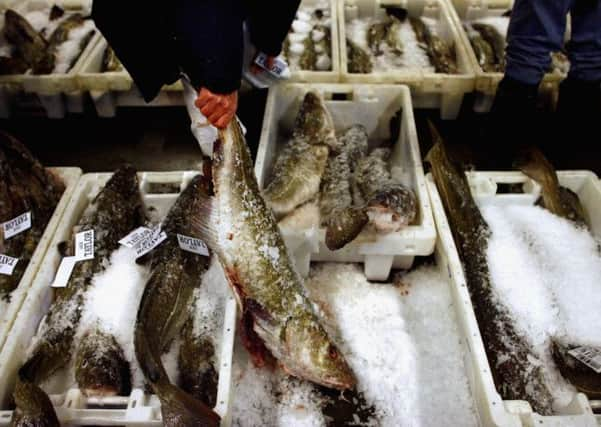Lochhead vows to fight EU cuts for Scots fishermen


European Fisheries minister are expected to spend two days in the Belgian capital setting vital catch limits for fish stocks in exclusively EU waters and days-at-sea allowances for 2014.
Quotas for important North Sea stocks such as cod, haddock and whiting, which are shared between the EU and Norway, will be set at a second round of talks early next year.
Advertisement
Hide AdAdvertisement
Hide AdSpeaking before leaving for Brussels, Mr Lochhead said his aim at the Fisheries Council negotiations would be to make the case for a freeze in effort in all sea areas and ensure that key decisions affecting Scottish quota are made according to the science.
Mr Lochhead said: “Scottish vessels account for 87 per cent of the UK’s total landings values across the key stocks, so it’s important our views are represented this week. This week’s Fisheries Council in Brussels is absolutely crucial in determining the health of Scotland’s fishing industry next year. In 2012 Scottish landings were worth £466 million, demonstrating the value of the industry to Scotland and to our coastal fishing communities in particular.
“This week we will be guided, as ever, by three fundamental principles; first, our approach will be guided by the science on stocks and sustainability; secondly, we will protect the social and economic wellbeing of our industry and the communities who depend on it; and, thirdly, we will act in line with our commitment to achieve discard-free fisheries.”
He continued: “I will again demand a freeze in the days at sea that are allocated to Scotland. I will make clear to the European Commission that more automatic cuts are unacceptable - otherwise our fleet simply will not have enough time at sea to catch its quotas.
“Scottish fleets are undertaking significantly improved cod avoidance activities which are having a positive effect on stocks. Now would be the worst possible moment to undermine that success by penalising fishermen with reduced time at sea. At last year’s Council we worked hard to garner support for an effort freeze in all sea areas among all the interested Member States. We agreed then, in spite of fierce resistance from the European Commission, that further reductions were not necessary after the four successive cuts previously imposed under the cod plan. Nothing has changed to alter that position and I will be insisting again this year that the UK takes a leading role in fighting for the continuation of the freeze at this year’s Council.”
Mr Lochhead added: “Mackerel has been added to the agenda this year and I am hopeful that this might create an opportunity to make progress on this long running issue. I have always wanted to see a deal in place to protect the future of what is our most valuable stock but I have been clear that this cannot be done at any cost. Scotland’s interests must be at the heart of any deal given that our fishermen, who have sustainably fished the stock for years now, are the EU’s largest mackerel quota holders.”
Bertie Armstrong, the chief executive of the Scottish Fishermen’s Federation, also warned of the need for “every effort” to be made to ensure that the Scottish fleet is not hit by further cuts in the number of days that vessels can put to sea next year. Annual reductions in days at sea are an integral part of the EU’s controversial cod recovery plan.
Mr Armstrong said: “It is essential that the Scottish and UK negotiating teams fight hard to ensure that the spectre of these cuts do not materialise. Stocks are recovering in spite of the dysfunctional cod plan, and if there are any further cuts in days, then there quite simply won’t be a fleet left to sustainably harvest this increased abundance of fish.”
Advertisement
Hide AdAdvertisement
Hide AdThe agreement on the share of North Sea landings between Norway an the EU has been delayed because of a failure to reach agreement on the share of mackerel catches with Iceland and the Faroes. However, cuts are being proposed for West of Scotland haddock and whiting, and West of Scotland and North Sea prawns.
A spokesman for the English-based National Federation of Fishermen’s Organisations said: “Only a fantasist would believe that quotas should always go up but there is no doubt that there is a significant element of self-inflicted pain in this year’s proposals that will do little for stock recovery, or progress towards discard reduction but will certainly make life more difficult for the industry.”
He added: “The council would normally just be expected to rubber stamp the agreement for a bilateral fisheries agreement with Norway which sets TACs (total allowable catches) for jointly managed stocks like cod, haddock, whiting, saithe, plaice and herring in the North Sea.
“However, the EU Norway negotiations have become another victim in the mackerel dispute with Iceland and Faeroes, as Norway has used the opportunity to revisit the issue of its own share. The result is that instead of council endorsing the deal, or tying up a few loose ends, the whole EU Norway agreement is left up in the air with no date so far for resumed negotiations.”